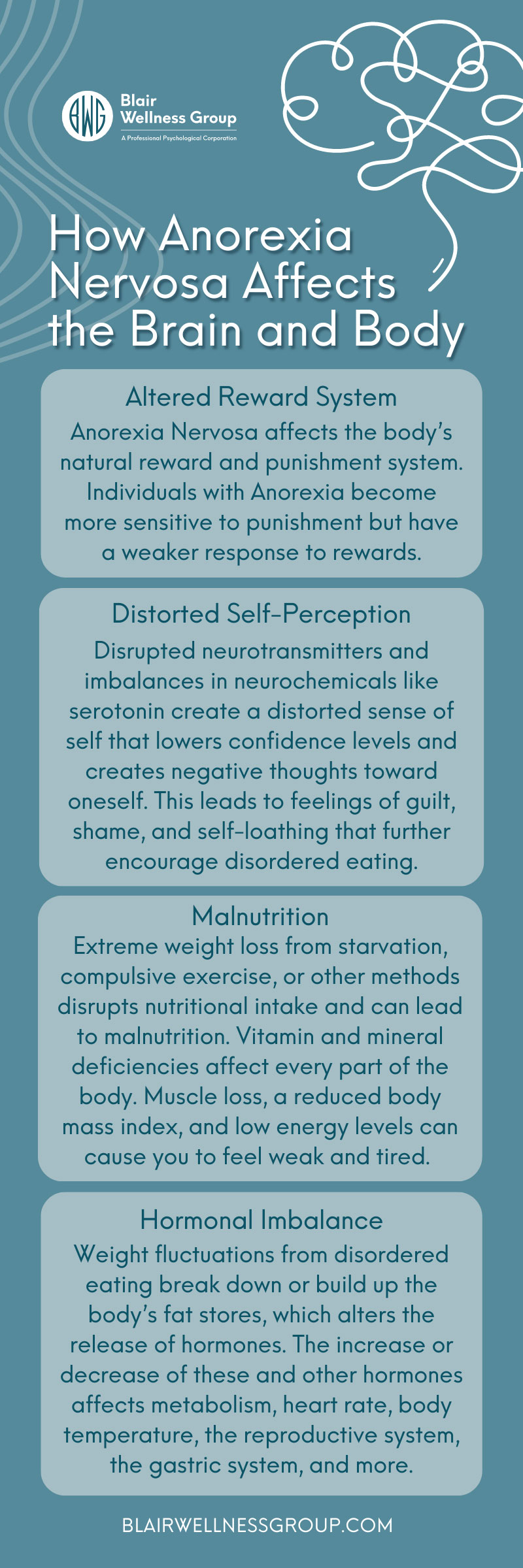Anorexia Nervosa is an Eating Disorder that involves an intense fear of gaining weight, which causes strict eating regulations and other maladaptive behaviors to control weight. The distorted body image and unhealthy weight loss behaviors associated with Anorexia take a serious toll on both the mind and body. People with Anorexia face a wide range of symptoms that put their physical health and mental health at serious risk.
These symptoms make it clear that Anorexia is a serious Eating Disorder that requires professional intervention. Read on to understand how Anorexia Nervosa affects the brain and body and see how treatment from a Licensed Clinical Psychologist is the key to overcoming this disorder.
How Anorexia Nervosa Affects the Brain
There are many Mental Health Disorders that can alter brain structure, but the severe restrictive behaviors of Anorexia Nervosa can have a larger impact on the brain than conditions like Depressive Disorders, ADHD, and others. One potential cause of this is the unhealthy weight loss that occurs with Anorexia Nervosa. The resulting reduction in body mass index can also decrease brain size and severely affect brain function.
This is just one of the many ways Anorexia Nervosa negatively alters brain matter, neurons, and neurotransmitters. These changes have a wide-reaching effect on the mind, causing the following maladaptive thought and behavioral patterns.
Altered Reward System
Anorexia Nervosa affects the body’s natural reward and punishment system. Individuals with Anorexia become more sensitive to punishment but have a weaker response to rewards. For example, someone with Anorexia will experience higher brain activity levels after experiencing bullying. This heightened punishment response worsens the already negative experience. However, if someone receives a compliment, they will experience lessened brain activity, limiting the positive response.
At the same time, Anorexia Nervosa creates extreme sensitivity to subjects such as appearance and weight. This makes comments about weight—such as teasing due to weight or compliments on weight loss—particularly impactful, therefore encouraging weight loss behaviors.
Distorted Self-Perception
Neurochemicals affect our self-perception and self-esteem. Anorexia also affects how you view yourself. Disrupted neurotransmitters and imbalances in neurochemicals like serotonin create a distorted sense of self that lowers confidence levels and creates negative thoughts toward oneself. This leads to feelings of guilt, shame, and self-loathing that further encourage disordered eating.
Moreover, a distorted sense of self hinders your ability to see yourself accurately in pictures or mirrors. Someone who is visibly unhealthy due to weight loss might still see themselves as overweight and continue limiting their food intake.
Difficulty Concentrating
Nutrient deficiency harms the brain’s ability to focus on tasks. As a result, people with Anorexia Nervosa often experience difficulty concentrating, switching tasks, and setting or following through with priorities. This hinders performance at work, school, and other areas of life.
Low performance in these crucial areas can create stress and further impact self-esteem. This creates a harmful cycle that exacerbates Anorexia and its symptoms. The brain’s extreme sensitivity to feelings of failure creates a strong negative experience that can cause you to retreat further into maladaptive behaviors, such as disordered eating. As disordered eating behaviors continue to hinder work or school performance, the cycle continues.
Memory Loss
Malnutrition and other physical symptoms of Anorexia can cause neurons to break down, which leads to a decrease in gray matter in the brain. This affects vital daily functioning, including processes like memory. Additionally, serotonin receptor imbalances in the frontal lobe and other regions of the brain can negatively affect memory, attention, and concentration. Memory impairment is a significant and lasting effect of Anorexia Nervosa, which is why it is important to address the issue and seek treatment as quickly as possible.
How Anorexia Nervosa Affects the Body
People with Anorexia Nervosa develop unhealthy behaviors in an attempt to lose weight. The most common one is self-starvation, but these behaviors can also include overexercising or taking laxatives or diuretics. Restricting the body in this way means depriving yourself of the nutrients you need to function at a normal level. In addition to extreme, unhealthy weight loss, Anorexia Nervosa’s detrimental effects on the body can include dehydration, malnutrition, cardiovascular issues, and more.
Dehydration
Dehydration can occur quickly—often showing its effects before other physical symptoms of Anorexia Nervosa arise. Common indicators of dehydration include extreme thirst, a rapid heartbeat, headaches, dizziness, confusion, and fainting. Dehydration quickly harms your body’s ability to function. Over time, it can also cause electrolyte imbalances, cardiovascular damage, kidney damage, and other severe conditions that can lead to the need for hospitalization.
Malnutrition
Extreme weight loss from starvation, compulsive exercise, or other methods disrupts nutritional intake and can lead to malnutrition. Vitamin and mineral deficiencies affect every part of the body. Muscle loss, a reduced body mass index, and low energy levels can cause you to feel weak and tired. Malnutrition can also cause dizziness, poor circulation, poor temperature regulation, decreased bone mass, increased risk of infection, poor wound healing, longer recovery times after an infection or illness, and much more.
Cardiovascular Issues
Cardiovascular issues are among the most common physical effects of Anorexia Nervosa. Many people with Anorexia experience bradycardia, or a slowed heart rate. Limited calorie intake can lead to muscles—including the heart—breaking down. This weakens the heart and slows down the heart rate. Over time, the heart can even shrink in size. A slower heart rate and weaker heart can cause low blood pressure, restricted oxygen in the brain and other organs, dizziness, fatigue, chest pain, and other dangerous symptoms. In extreme cases without treatment, Anorexia can even cause congestive heart failure.
Hormonal Imbalance
All Eating Disorders, including Anorexia Nervosa, can create hormonal imbalances. Weight fluctuations from disordered eating break down or build up the body’s fat stores, which alters the release of hormones. This affects crucial hormones, including estrogen, testosterone, and thyroid hormones. The increase or decrease of these and other hormones affects metabolism, heart rate, body temperature, the reproductive system, the gastric system, and more.
Treating the Mind and Body Together
The mind and body are interconnected; what harms one harms the other. To treat the harmful physical and mental effects of Anorexia, you must treat the Eating Disorder itself. A Licensed Clinical Psychologist for Eating Disorders understands how Anorexia Nervosa affects the brain and body together. Seeking help from a mental health professional teaches you to restructure maladaptive thought patterns, overcome harmful behaviors, and heal from all the symptoms of Anorexia Nervosa.

Dr. Cassidy Blair is a renowned Licensed Clinical Psychologist and trusted Performance Coach who specializes in providing Concierge-Psychological Care and Executive Coaching for high-achieving professionals. With a deep understanding of the unique challenges faced by CEOs, executives, entrepreneurs, and leaders, Dr. Blair offers tailored, confidential care designed to foster emotional well-being, personal growth, and professional excellence. Her clientele values her discretion, clinical expertise, and emotionally intelligent approach to navigating complex personal and professional dynamics.
- This author does not have any more posts.




